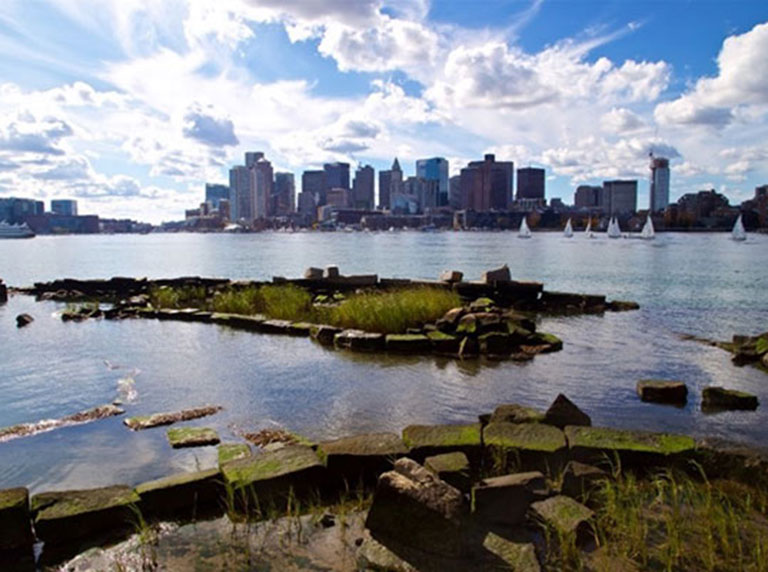Project Leads: Paul Kirshen & Amit Patel
Research Assistant: Jessica Lillquist
Start Date: 2021
Summary
Coastal cities such as Boston are already experiencing coastal flooding from storms and high tides, and the risk will increase in the future due to climate change and sea-level rise. Boston is currently considering Nature-Based Solutions (NBS) to plan for and adapt to these changing conditions. NBS are strategies that work with and enhance nature to help address challenges such as climate change. An example of an NBS is the expansion of salt marsh or other wetlands to protect communities from flooding during coastal storms.
This project will use a test model to figure out which policies might be useful for increasing the use of Nature-Based Solutions. The model will compare opinions on different policies across different groups of people such as community members, local government officials, and property developers.
Background
The City of Boston and other municipalities in Boston Harbor are already vulnerable to coastal flooding from storms and exceptional high tides, and the risk will increase in the future due to climate change and associated sea-level rise. Among numerous engineering and policy-based approaches to manage flooding, Nature-Based Solutions (NBS) have emerged as potentially the most effective adaptation measures for Boston. The Mayor of Boston recently committed the City to using primarily shore-based NBS. NBS mimic some of the performance of natural systems while producing ecological and socio-economic co-benefits. Implementation of NBS will require cooperation and financial support from many public and private stakeholders.
There are engineering challenges associated with all adaptation strategies, but equally important are those challenges presented by social, economic, and political dynamics relating to human behavior. These dynamics are not fully understood, particularly in such a diverse and uncertain coupled natural and human system as Boston, and require further exploration to better implement adaptation strategies such that they serve the communities, especially underserved communities they intend to support.
Research Objectives
The main objective of the proposed research is to develop and recommend robust policies for NBS that explicitly recognize the significance of human behavior to ensure that these strategies may be designed and implemented to succeed in Boston. The key contribution of this research is a deeper understanding of the individual-level human behavior and socio-economic and political processes that shape engineering solutions and research.
Ultimately, this project will not only help to identify policies for NBS development in Boston to ensure they are best suited for the areas they intend to serve, but this project will also contribute to the broader knowledge on implementation of NBS globally.
Methodology
An agent-based model will be used to test various adaptation policies in a simulated environment where experiments can be conducted to inform the design and implementation of such policies in the real world. The agents in the proposed model will represent the major stakeholders (as groups) in Boston, such as local government officials, developers, and residents, as they plan for flood management over time. The model will consider the uncertainties associated with climate change, human behavior, the performance of various adaptation strategies, as well as other driving forces. Our methodology includes engagement with major stakeholders in conceptualizing the model and assessing the results.
Schedule
This project extends from January 2021 to Summer 2023 with intermediate results over that period as well as a final report.
